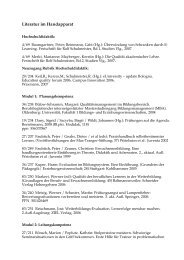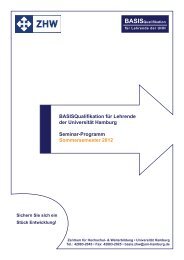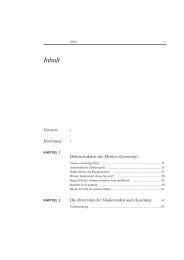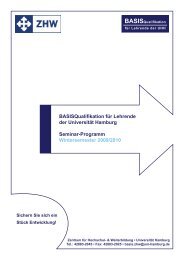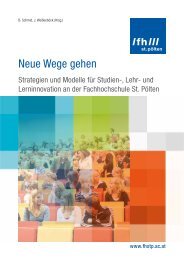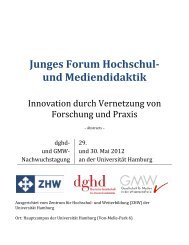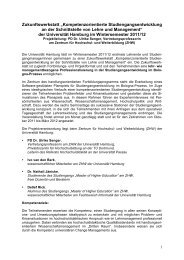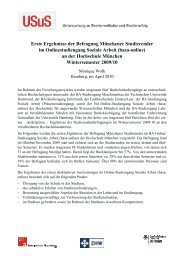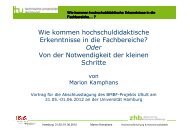“Gibt es eine Net Generation?” (PDF) - ZHW - Universität Hamburg
“Gibt es eine Net Generation?” (PDF) - ZHW - Universität Hamburg
“Gibt es eine Net Generation?” (PDF) - ZHW - Universität Hamburg
Erfolgreiche ePaper selbst erstellen
Machen Sie aus Ihren PDF Publikationen ein blätterbares Flipbook mit unserer einzigartigen Google optimierten e-Paper Software.
Schulmeister: Gibt <strong>es</strong> <strong>eine</strong> <strong>Net</strong> <strong>Generation</strong>?<br />
1. The terms are ahistorical. They give rise to the myth that this is the FIRST generation<br />
where kids have known more about technology than their parents. I hear this claim<br />
again and again from people who should know better and it is simply not true.<br />
2. It collaps<strong>es</strong> all young people into a so-called digital generation. David Buckingham,<br />
the British r<strong>es</strong>earcher, was the first to really help me understand the risks involved<br />
here. […] The Digital Nativ<strong>es</strong> metaphor do<strong>es</strong>n‘t acknowledge either the digital divide<br />
(in young people‘s acc<strong>es</strong>s to the technologi<strong>es</strong>) or the participation gap (in<br />
young people‹s acc<strong>es</strong>s to the social skills and cultural competenci<strong>es</strong> needed to fully<br />
and meaningfully participate in the emerging digital culture.)<br />
3. It ignor<strong>es</strong> the degree that what‘s really powerful about most of the new forms of participatory<br />
culture of fans, bloggers, and gamers is that such affinity spac<strong>es</strong> allow<br />
young people and adults to interact with each other in new terms. Th<strong>es</strong>e affinity<br />
spac<strong>es</strong> (to use Jam<strong>es</strong> Paul Gee‘s term) bring together youth and adults who don‘t<br />
have fixed and hierarchical relationships (students/teachers, children/parents) on the<br />
basis of their shared inter<strong>es</strong>ts« (Jenkins 2007 Part 1).<br />
»Es gibt noch k<strong>eine</strong> soliden ausführlichen und gut begründeten Widerlegungen«. Di<strong>es</strong>en<br />
Satz hatte ich im Dezember 2007 g<strong>es</strong>chrieben und den Aufsatz fast beendet, als am<br />
18. Januar 2008 <strong>eine</strong> Studie d<strong>es</strong> Centre for Information Behaviour and the Evaluation of<br />
R<strong>es</strong>earch (CIBER) d<strong>es</strong> University College London zur »Google <strong>Generation</strong>« erschien,<br />
die die British Library zusammen mit der staatlichen Agentur JISC finanziert hatte 25 .<br />
Kurz danach erschien im Januar 2008 unter den OnlineEarly Articl<strong>es</strong> d<strong>es</strong> British Journal<br />
of Educational Technology (2008) der Aufsatz der Australier Sue Bennett, Karl Maton<br />
und Lisa Kervin (2008) mit dem Titel »The ›digital nativ<strong>es</strong>‹ debate: A critical review of<br />
the evidence« und machte deutlich, dass sich in Australien <strong>eine</strong> Forschungsgruppe um<br />
Gregor Kennedy von der University of Melbourne mit der Thematik befasste. 26 Das Fazit<br />
ihrer gründlichen Auseinandersetzung mit der Th<strong>es</strong>e der <strong>Net</strong>zgeneration und der Studie<br />
von Beverley Oliver und Veronica Goerke (2007) ist wohlbegründet:<br />
»Grand claims are being made about the nature of this generational change and about<br />
the urgent nec<strong>es</strong>sity for educational reform in r<strong>es</strong>ponse. A sense of impending crisis pervad<strong>es</strong><br />
this debate. However, the actual situation is far from clear. In this paper, the<br />
authors draw on the fields of education and sociology to analyse the digital nativ<strong>es</strong> debate.<br />
The paper pr<strong>es</strong>ents and qu<strong>es</strong>tions the main claims made about digital nativ<strong>es</strong> and<br />
analys<strong>es</strong> the nature of the debate itself. We argue that rather than being empirically and<br />
theoretically informed, the debate can be likened to an academic form of a ›moral<br />
panic‹.«<br />
»Our analysis of the digital native literature demonstrat<strong>es</strong> a clear mismatch between the<br />
confidence with which claims are made and the evidence for such claims. So, why have<br />
25 [http://www.bl.uk/news/pdf/googlegen.pdf] Den Hinweis auf das Projekt habe ich Mandy Schiefner zu verdanken.<br />
[http://www.bl.uk/news/2008/pr<strong>es</strong>srelease20080116.html]. Das Executive Summary zum Projekt »Information Behaviour<br />
of the R<strong>es</strong>earcher of the Future« (16. Januar 2008) ist im Internet erhältlich. Berichte über fünf Work Packag<strong>es</strong><br />
und zwei Sonderauswertungen [http://www.ucl.ac.uk/slais/r<strong>es</strong>earch/ciber/downloads/] gibt <strong>es</strong> bei UCL CIBER.<br />
26 Den Hinweis auf di<strong>es</strong>en Aufsatz habe ich ebenfalls Mandy Schiefner zu verdanken.<br />
41





